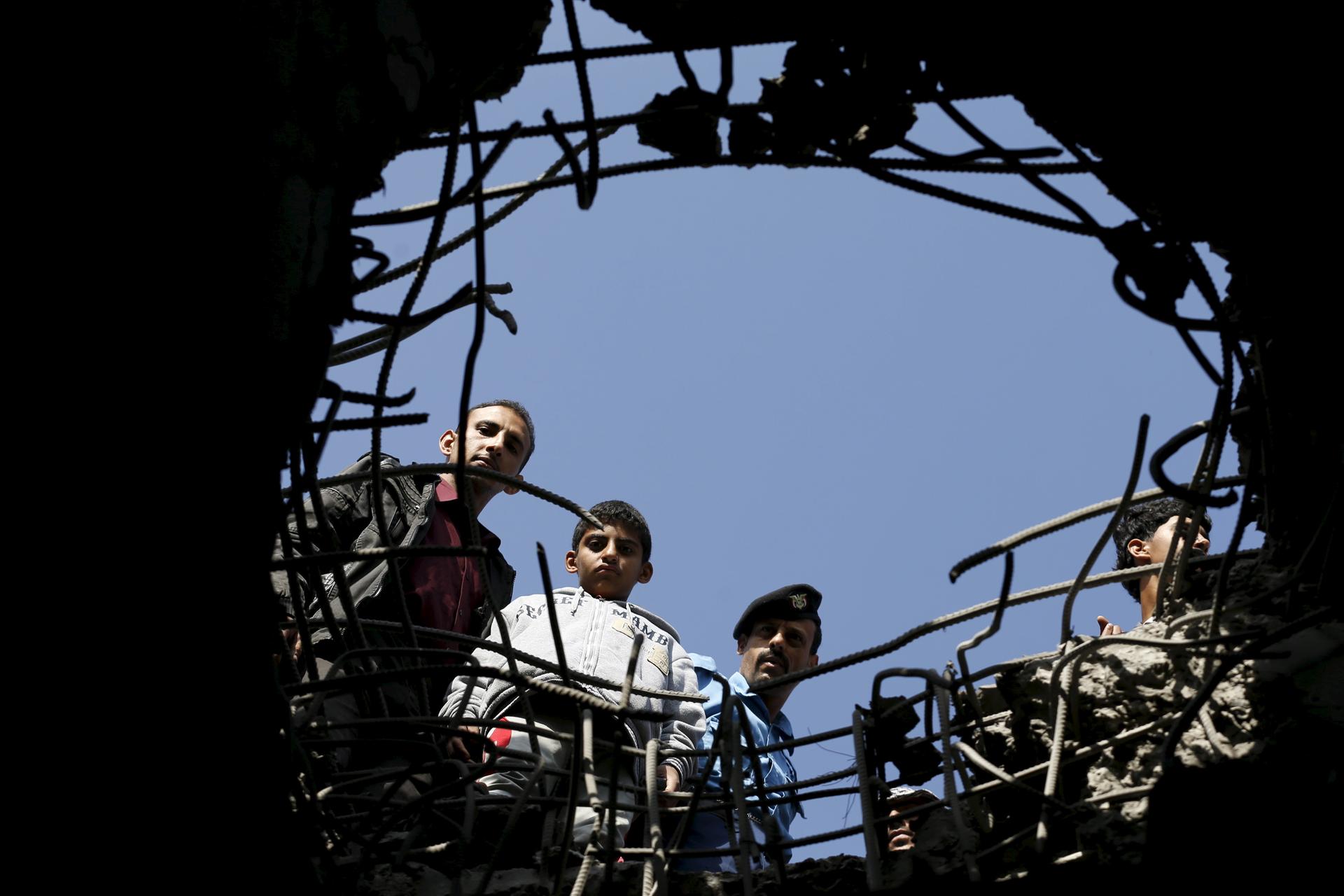People look through a hole caused by a Saudi-led air strike on a bridge in Yemen's capital Sanaa March 23, 2016.
Saudi Arabia has signed on to a ceasefire and negotiations to end the war in Yemen. But some Yemeni civilians are not holding their breath.
“Nobody believes in ceasefires anymore,” says a Yemeni woman who chose the pseudonym Fatima. “The announcement of ceasefires are not aimed at us,” she texted me from her home in the capital, Sanaa. “They are aimed at the international community and media.”
The UN Special Envoy to Yemen, Ismail Ould Cheikh Ahmed, announced Wednesday that Saudi Arabia and other warring parties in Yemen have agreed to observe a “cessation of hostilities" beginning at midnight on Sunday, April 10. The announcement came as many Yemenis prepared to mark a somber anniversary: a full year since the Saudi-led coalition launched its first airstrike against rebel forces in Yemen.
The UN reports that more that 3,000 civilians have died in a year of fighting, more than half of them killed as a result of Saudi-led coalition airstrikes. The Royal Saudi air force and the United Emirates air force, the two major air powers in the war, fly fighter jets made by the United States and Britain. They get in-flight refueling from US air force tankers. The coalition selects its targets with help from US and UK personnel who work alongside Saudi military planners.
Fatima is suspicious of the timing of the latest announcements. “Ceasefires are to divert attention from what's going on,” she told me, “and also to save Saudi's allies, the US and UK — and the UN — the embarrassment.”
Yemenis are still talking about two airstrikes on a busy marketplace last week in northwest Yemen. UN investigators who went to the scene said “the attack had apparently taken place during the afternoon rush hour when the market was particularly crowded.” In all, 119 civilians were killed, including 22 children.
The incident inspired the UN High Commissioner for Human Rights Zeid Ra’ad Al Hussein to rip into the Saudis for a year of abuses. “They have hit markets, hospitals, clinics, schools, factories, wedding parties — and hundreds of private residences in villages, towns and cities including the capital Sana’a,” the High Commissioner said in a press release. “Despite plenty of international demarches,” Zeid said, “these awful incidents continue to occur with unacceptable regularity.”
The Saudis did not acknowledge responsibility for the attacks, but did announce — perhaps to deflect criticism — that the coalition was now “in the end of the major combat phase.”
The Saudi’s upbeat response to the incident was no surprise to Fatima. “You can see a pattern,” she told me. She, like many Yemenis, keeps track of air strikes. “I remember the ones that have the most emotional toll on myself."
“On April 20, 2015 the Saudis dropped a massive bomb on Sanaa,” she says. “It caused enormous destruction to a huge area in the capital… and caused [a] major outcry on social media and rights groups.”
The next day Saudi Arabia announced that its military operation “Decisive Storm” had ended, and the coalition would begin its “Operation Restore Hope.” The Saudis were lauded for launching this new humanitarian phase.
“A few days later the strikes escalated,” Fatima says. “It was just a diversion of media attention.”
Fatima ticks off other examples. “A ceasefire on May 12,” which followed news of an airstrike in Sa’wan, east of the capital, that had killed 17 civilians, reported by Amnesty International.
”And a massacre on a market and a restaurant in Zabid … The Saudis said it's a five-day ceasefire to allow aid in… Lies. Didn’t happen.”
In July, coalition planes targeted two apartment complexes near the power plant at al-Mokha. Human RIghts Watch documented the incident, in which nine bombs were dropped, killing 120 residents.
The next day, outrage over civilian deaths was papered over with a Saudi ceasefire announcement.
Only the Saudis know whether they announce ceasefires to deflect criticism of possible war crimes. Fatima believes the timing is deliberate. “Obviously they know how to spin news,” she says. “But they can't keep using the same strategy, because people are noticing.”
Dhamar University student Ahmed Algohbary has kept his own list of air strikes and subsequent ceasefires. Ahmed hopes that the April 10 ceasefire will bring a full stop to the fighting. But like Fatima, he is not optimistic. “Because [in] all the previous ceasefires,” he writes, “Saudi used it as a cover up for new operation in Yemen… For me as a Yemeni,” Ahmed says,”I don’t think that this ceasefire will be any different.”
Sarah Leah Whitson, Middle East and North Africa Director for Human Rights Watch, did not want to speculate on whether Saudi Arabia invokes ceasefire announcements, deliberately, to deter public criticism following attacks.
But she says, "There's certainly a correlation, such as immediately following the most recent strike on [the] market… which the UN High Commissioner for Human Rights very strongly condemned. Immediately following that, there was a ceasefire announcement and the notion that there would be peace talks.
"Mind you," Whitson adds "the airstrikes have continued each time a ceasefire has been promised or announced, so it's not clear at all that there's any commitment to an actual ceasefire."
HRW's Whitson does see good reason for the Saudis to choose this week to announce peacemaking moves. "I think they certainly see it in their interest to avoid the ongoing bad press about their disastrous campaign in Yemen," she says, "and groups like ours that continue to expose the indiscriminate bombs which they've rained down in Yemen."
I reached out to the Saudi Embassy in Washington, DC for comment, but they did not respond in time for this article.
We want to hear your feedback so we can keep improving our website, theworld.org. Please fill out this quick survey and let us know your thoughts (your answers will be anonymous). Thanks for your time!
